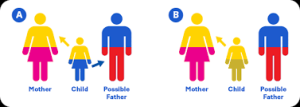Ekiti State University’s Professor Olofinbiyi Babatunde has shed new light on the complex and often hidden realities of paternity testing in Nigeria, particularly within Yoruba communities. In a recent interview on while featuring on a health discussion program, Professor Olofinbiyi, a leading expert in Obstetrics, Gynaecology, and Adolescent Reproductive Health, discussed the profound impact and ethical considerations surrounding paternity tests.

During the discussion, Professor Olofinbiyi revealed that paternity testing, which determines the biological father of a child through DNA comparison, is a critical tool for truth and justice, despite its potential to cause familial distress. He expressed concern over findings from the Smart DNA Center in Lagos, which suggested that 27% of Nigerian men may not be the biological fathers of their children. He warned that this figure could be even higher in rural areas, where limited access to testing facilities and cultural norms contribute to hidden relationships.

Professor Olofinbiyi highlighted several reasons for conducting paternity tests, ranging from clarifying uncertainties in biological relationships to addressing legal and medical needs. He pointed out that in cases of infertility or extramarital affairs, paternity tests can be crucial, though the results may have devastating consequences, including emotional trauma and familial discord.

Professor Olofinbiyi also warned about the potential pitfalls of paternity testing, such as errors in sample handling, technical issues, or even fraudulent claims. He stressed the importance of conducting these tests with high accuracy and under strict confidentiality to protect individual privacy and prevent misuse.

In his concluding remarks, Professor Olofinbiyi called on policymakers to implement evidence-based measures that provide comprehensive support to all affected parties, including the man, the child, the mother, and the family. He emphasized the need for increased awareness and accessibility to paternity testing, along with ethical guidelines to ensure responsible use.





